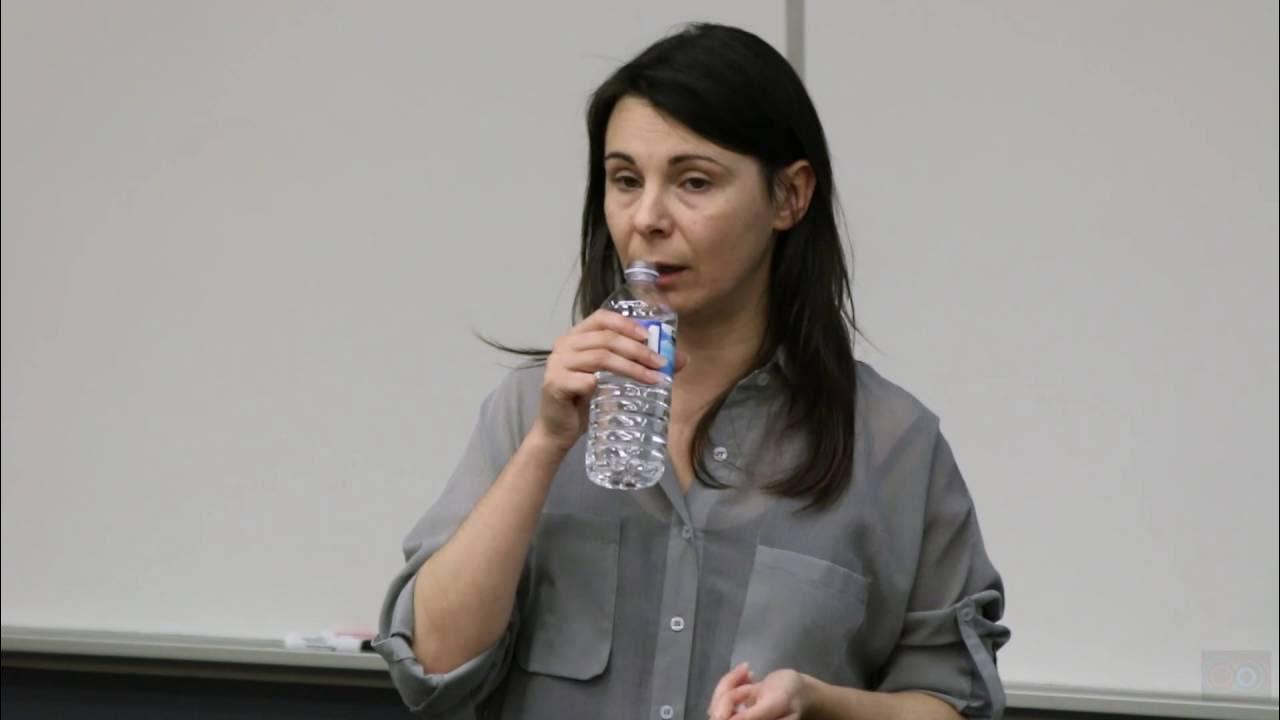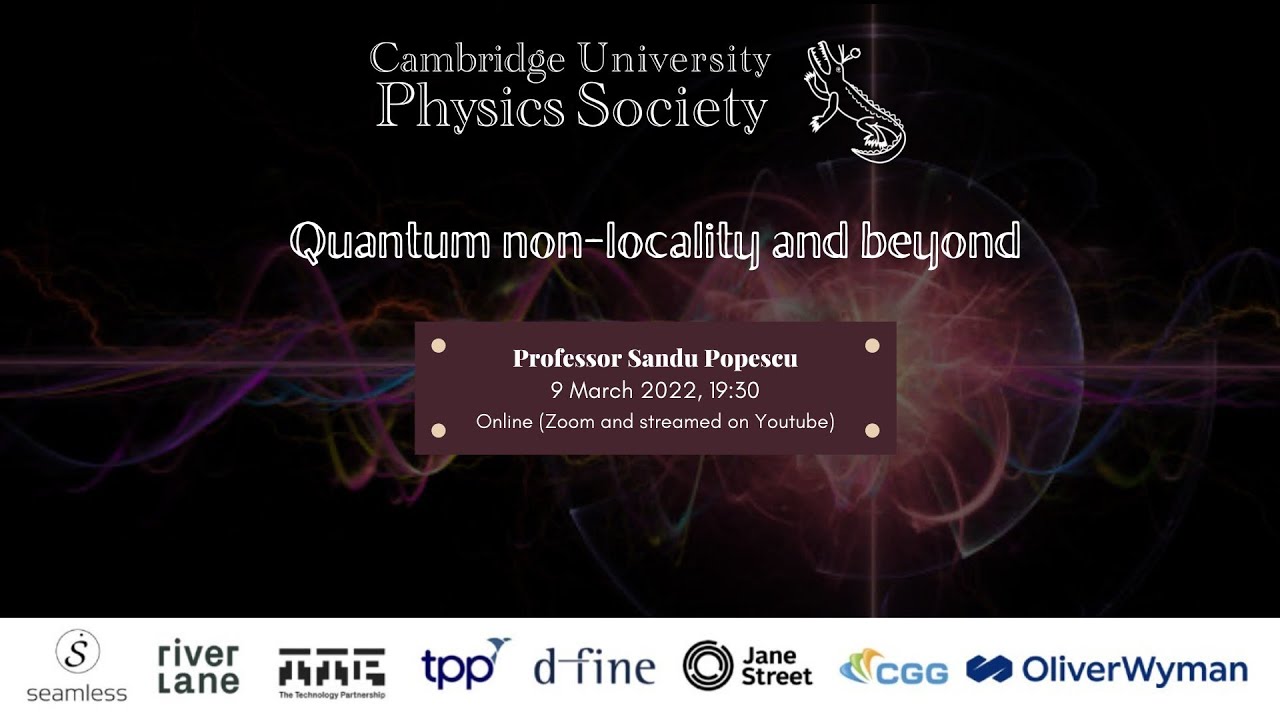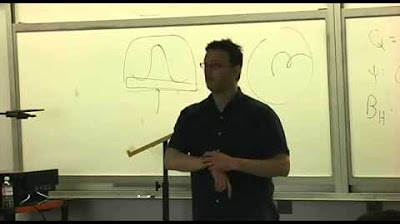Richard Healey: Correlations, probabilities and quantum states
TLDRThe transcript captures a conference discussion on the information-theoretic interpretations of quantum mechanics, delving into the philosophical and scientific perspectives on quantum theory. It highlights the contributions of Jeffrey Bub and the significance of John Bell's theorem, exploring the concepts of quantum states, probabilistic correlations, and the nature of reality in quantum mechanics. The debate touches on realism, instrumentalism, and the role of information in quantum theory, questioning the need for a common cause explanation and challenging the traditional views on locality and determinism.
Takeaways
- 📚 The conference focuses on information theoretic interpretations of quantum mechanics, involving both philosophers and physicists with diverse perspectives on the subject.
- 📖 The publication of Jeffrey Bub's book 'Banana World' is celebrated, which has been influential in discussions on the foundations of quantum mechanics and quantum information theory.
- 🕊️ The 50th anniversary of John Bell's seminal paper on hidden variables and the same issue featuring papers by David Bohm and Yakir Aharonov is acknowledged.
- 🔑 There is an agreement that the state vector in quantum theory does not represent knowledge or reality in the traditional sense, challenging realist interpretations.
- 🚫 Both Bub and the speaker reject popular realist interpretations like Bohmian mechanics and Everettian approaches, as well as instrumentalist views, as inadequate.
- 🌐 The concept of quantum theory being about probabilistic correlations is agreed upon, but there is a divergence in how these correlations are understood and applied.
- 🤔 The speaker introduces a pragmatist view of quantum theory, suggesting that quantum probabilities are objective but not features of physical reality, differing from Bub's perspective.
- 🔄 The idea that quantum states are relational and can vary depending on the physical situation of different agents is highlighted, affecting the probabilities assigned to events.
- ⚖️ The discussion on probability includes a nuanced look at David Lewis's 'Principal Principle' and its modification to fit with relativistic space-time structure.
- 🌌 The script delves into the nature of quantum probabilities and challenges the notion of intrinsic randomness, suggesting a more complex relationship with physical reality.
Q & A
What is the main theme of the conference mentioned in the script?
-The main theme of the conference is the information theoretic interpretations of quantum mechanics, bringing together philosophers and physicists to discuss foundational aspects of quantum theory.
Who is Jeffrey Boop and why is his work significant in the context of this conference?
-Jeffrey Boop is an author whose book 'Banana World' is mentioned as an occasion for the conference. His contributions to the foundations of quantum theory and his early interest in quantum information theory are significant, particularly how he viewed quantum mechanics' puzzling features as a resource rather than a problem.
What is the 50th anniversary referred to in the script?
-The 50th anniversary referred to is the publication of John Bell's seminal paper on hidden variables in the July issue of Reviews of Modern Physics, which is a significant milestone in the field of quantum mechanics.
What does the speaker suggest about the current understanding of quantum mechanics?
-The speaker suggests that the current understanding of quantum mechanics may differ among individuals and that the puzzling features of quantum mechanics are increasingly being seen as resources rather than problems to be solved.
What is the speaker's view on the state vector in quantum theory?
-The speaker agrees with Jeffrey Boop that the state vector or any mathematical representative of the quantum state does not represent our knowledge and is not accessible in the way that some people believe.
What is the speaker's stance on realist interpretations of quantum theory?
-The speaker and Jeffrey Boop agree that currently popular realist interpretations of quantum theory, including Bohmian mechanics and Everettian approaches, misinterpret quantum theory.
What is the relationship between probability and statistical data according to the speaker?
-The speaker posits that probability is used to model statistical phenomena, and while statistical data may manifest probabilistic phenomena, they do not determine the probabilities. This is a rejection of a frequency interpretation of probability.
What does the speaker mean by 'non-localized correlations' in quantum theory?
-Non-localized correlations refer to correlations among events that occur in different spacetime locations. The speaker suggests that these correlations are structurally different from those in classical theories and are not indicative of 'spooky action at a distance' as sometimes interpreted.
What is the speaker's view on the role of quantum states in quantum theory?
-The speaker, taking a pragmatist view, suggests that the main function of quantum states is to yield probabilities by the Born rule for magnitude claims, and that the assignment of quantum states is objective and determined by physical conditions.
How does the speaker approach the concept of probability in the context of quantum theory?
-The speaker approaches probability by considering it as providing advice to a physically situated agent on how strongly to believe statements about events, given the limitations on the information that is physically accessible to them.
What is the speaker's perspective on the role of agents in quantum theory?
-The speaker emphasizes that quantum theory is applicable to any actual or hypothetical agent in a physical situation and that the concept of an agent is central to understanding the application of quantum theory, including the notions of probability and causation.
What does the speaker suggest about the nature of change in the context of relativity?
-The speaker suggests that the concept of change needs to be understood relative to space-time points rather than universal time, and that change is not an inherent feature of the world but is relative to different perspectives in space-time.
What is the significance of the script's discussion on intrinsic randomness in quantum mechanics?
-The speaker discusses intrinsic randomness as a feature of quantum systems that does not require further explanation, suggesting that it is an essential aspect of quantum theory that differentiates it from classical theories, although the exact nature and implications of this randomness are still a subject of debate.
Outlines
📚 Opening Remarks on Quantum Mechanics and Information Theory
The speaker opens the conference by welcoming attendees and setting the stage for a discussion on the intersection of quantum mechanics and information theory. They highlight the importance of understanding quantum mechanics from different perspectives, acknowledging the diversity in knowledge levels and interpretations among the participants. The conference celebrates the publication of Jeffrey Boop's book, 'Banana World,' and its influence on the field. The speaker also marks the anniversary of John Bell's seminal paper on hidden variables and the foundational contributions of David Bohm and Yakir Aharonov, emphasizing the evolution of discussions on quantum foundations and the shift towards viewing quantum mechanics through the lens of quantum information theory.
🤔 Philosophical and Scientific Debates on Quantum Theory
The speaker delves into a comparison of his views with those of Jeffrey on understanding quantum theory, focusing on broad strokes rather than the intricate details of the book. They find common ground in the rejection of certain interpretations, such as realist views including Bohmian mechanics and Everettian approaches, as well as the insufficiency of instrumentalist interpretations. The speaker discusses the concept of probabilistic correlations in quantum theory, disagreeing with the notion that the quantum state vector represents knowledge or reality. Instead, they propose a pragmatist view where quantum theory is about the structure of information and the probabilistic correlations it predicts, which are distinct from classical theories.
🔬 Probabilistic Correlations and Their Implications
The speaker explores the concept of probabilistic correlations in quantum theory, challenging the idea that they are determined by statistical data. They argue that probabilistic phenomena are abstract and not directly constituted by data, using the example of coin flips to illustrate the difference between a manifestation of probability and a single instance that is compatible with it. The speaker also addresses the disagreement on what constitutes 'realizable' correlations, suggesting that Bell's theorem and the concept of non-locality are misunderstood and that quantum theory itself may offer a way to explain non-localized correlations without invoking action at a distance.
📉 Quantum States and the Role of Agents in Quantum Theory
The speaker discusses the function of quantum states and their role in providing probabilities for magnitude claims through the Born rule. They emphasize the importance of the context in which quantum theory is applied, suggesting that the theory itself is not about predicting observations but rather about the probabilistic correlations that are of interest to agents. The speaker also touches on the concept of agency, differentiating between passive observers and agents capable of applying quantum theory to achieve certain outcomes, and the significance of environmental decoherence in determining which magnitude claims have well-defined content for the application of the Born rule.
🧠 The Concept of Change and the Relativity of Time
The speaker addresses the concept of change in the context of quantum mechanics and relativity, challenging the notion of a universal time to which change is relativized. They argue that change should be understood with respect to space-time points rather than time slices, suggesting that the idea of predetermination in quantum mechanics is not about time slices but about the probabilities assigned to events at specific space-time points. The speaker also discusses the implications of this view for the understanding of quantum entanglement and the nature of quantum states, emphasizing the importance of the environment in determining the content of magnitude claims.
Mindmap
Keywords
💡Information Theory
💡Quantum Mechanics
💡Quantum Information Theory
💡Entanglement
💡Bell's Theorem
💡Non-locality
💡Pragmatism
💡Born Rule
💡Intrinsic Randomness
💡Local Causality
💡Measurement Problem
Highlights
Introduction to a conference on information theoretic interpretations of quantum mechanics, emphasizing the interdisciplinary nature of the event.
Publication of 'Banana World' by Jeffrey Boop, a seminal work in quantum theory and information theory.
50th anniversary of John Bell's paper on hidden variables and the significance of its impact on quantum mechanics.
Jeffrey Boop's early interest in quantum information theory and its influence on contemporary discussions.
Shift in perspective where quantum mechanics' puzzling features are seen as resources rather than problems.
The importance of understanding the language and terms used in different fields of quantum mechanics.
Agreement on the inadequacy of realist interpretations and the misinterpretation of quantum theory by popular approaches.
Debates on the nature of quantum states and their representation of knowledge versus physical reality.
Discussion on the concept of probability in quantum mechanics and its distinction from classical theories.
The role of quantum theory in explaining non-local correlations and the debate on the term 'non-locality'.
Comparative analysis between quantum theory and relativity, questioning the validity of the analogy.
Exploration of the pragmatist view on quantum theory and its focus on probabilistic correlations.
Critique of the frequency interpretation of probability and the introduction of a modified Lewisian chance.
The function of probability in advising a physically situated agent on the strength of belief in events.
The concept of quantum states as relational and the impact of different physical situations on their assignment.
Discussion on the violation of Bell inequalities and the implications for quantum theory's deterministic nature.
Common cause explanations and the debate on the role of intrinsic randomness in quantum systems.
Analysis of the locality condition in Bell's theorem and the potential for non-factorizable common causes.
The role of information in quantum theory and the response to Bell's questions about the nature of information in quantum mechanics.
Transcripts
Browse More Related Video

Laura Felline: Scientific explanation in information-theoretic reconstructions of quantum theory

Professor Sandu Popescu - Quantum non-locality and beyond

Thermodynamics as a Resource Theory: Day 1 General Discussion

Wayne Myrvold: Collapse Theories for Relativistic QFT: Problems and Prospects

Bell's Theorem: The Quantum Venn Diagram Paradox

Gordon Belot: The Wave Function for Primitive Ontologists
5.0 / 5 (0 votes)
Thanks for rating: